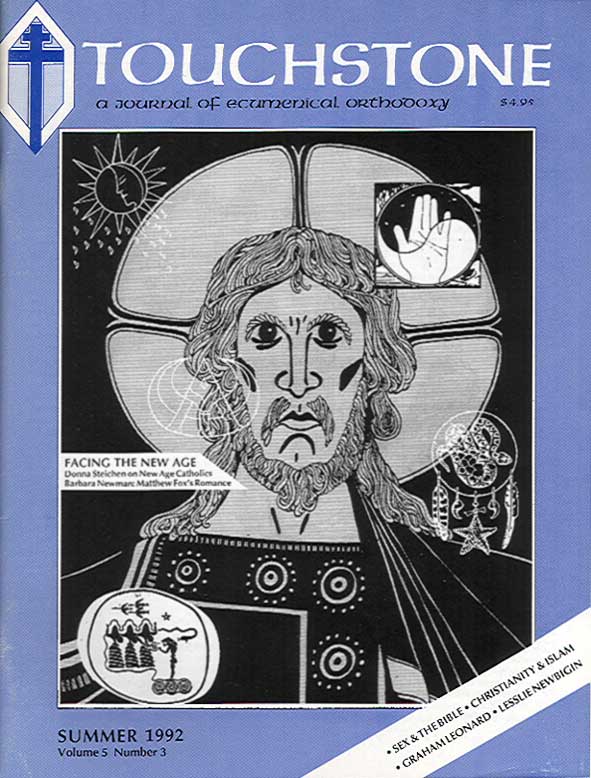Feature
The Bible Tells Me So
Everything You Need to Know About Morality & the Bible David Mills
A colleague once attacked me in a meeting, then cut off my response by turning to our supervisor, thrusting his fist into the air, and declaring, “ I’m not interested in the past, I care about the future!” In one move he managed to insult me, prevent me from responding, and portray himself as (in contrast to me) both forgiving and idealistic. This sort of linguistic terrorism leaves most of us stumbling over our own feet, while our opponents trot smugly over the finish line.
One feels much the same when engaged in arguments, especially arguments over sexual morality, with our liberals. Liberal or skeptical Christians have been inventing and field-testing ways of getting around biblical teaching for a very long time, and they have gotten very good at it. They are now so sophisticated that average Christians, who are called to pursuits other than biblical scholarship and theology, can give no convincing answers to their exotic proposals for revising the Christian faith.
Two Observations
I will take sexual morality as an example, not because (as our liberals keep hinting) orthodox Christians are afraid of sex, but because it is where the debate on biblical teaching has been most clearly joined.
Unlike the modernists of old, our liberals are usually quite happy to let us believe in the Virgin Birth or the bodily Resurrection, or for that matter praying in tongues, presumably on the assumption that it keeps us occupied and out of their way. They only object when we dare to argue for moral limitations and ideals they have long ago abandoned. They will tolerate the most extravagant supernaturalism, as long as it is not assumed that the supernatural makes binding statements about human sexual behavior.
Orthodox Christians (with the embarrassing exception of groups trying to raise money) actually talk far less about sex than the representatives of liberalism. Some Christians on both sides are rather unhealthily concerned with sex. They have sex on the brain, which, as someone remarked, is an odd place to have it.
But if we tend to talk a lot about sex, we do so because it is the aspect of the inherited Christian moral teaching most directly challenged by our culture and, sadly, by powerful and vocal movements in our own churches. The use of sex is the question of the hour. To accuse orthodox Christians of being obsessed with sex is somewhat like accusing firemen in a city victimized by arsonists of thinking too often about fires.
The Authority of Scripture
The question of what the Bible really says is a problem because, when members of the major churches discuss moral questions, surprisingly enough they are all still talking about the Bible. Even the most radical Christian still appeals to the authority of Scripture, or to be more precise, to Scripture as an authority. Whatever limitations he wants to put upon that authority, or other authorities he wants to add, he still looks for what support he can find in the Bible.
In Living in Sin?, for example, Bishop John Spong attempted to ground his moral innovations in the Bible. He argued that though we should ignore the Bible’s prohibition of sex outside marriage because “science” tells us that some people are not made for marriage and current social practices tell us that many want sex without marriage, we should endorse its belief in monogamy.
You may remember Spong’s shock several years ago when one of his priests— whom the bishop had ordained with great publicity because of his open practice of homosexuality—denigrated monogamy as “unnatural” and said Mother Teresa would be a more effective minister if she were sexually experienced. The bishop removed his license to function as a priest, though, as several commentators noted at the time, the priest was only being faithful to the bishop’s own assumptions about the superiority of cultural practices to biblical injunctions. But despite his rather confused approach to the Bible, Bishop Spong still tries to get its support whenever he can.
In a book called Dirt, Greed, and Sex, a professor at an Episcopal seminary based his entire moral teaching on the one verse that Jesus “made all things clean.” (He reads that verse, contrary to established Anglican principle, to contradict other verses, not least the first chapters of Genesis.) What we call biblical morality, he argued, is unfaithful to the Bible. He contended that the Old Testament prohibition of homosexual acts expressed a “purity ethic” no longer needed now that all things have been made clean. This led him to the extraordinary conclusion—one among several—that “among the young and those in temporary isolation, bestiality should not occasion too much concern.” It might not occasion him too much concern, but one does wonder what the sheep are thinking, grazing nervously whenever an Episcopalian walks by.
I am told this sort of thing happens in other churches as well—except for Orthodoxy, which is spared (for the moment) the subtleties of liberalism—and that, if anything, the Bible is newly fashionable in liberal circles. We all still take Scripture as an authority of some sort, but it hasn’t gotten us very far.
A Few Examples
A few examples from the current movement to legitimize homosexual relationships show the problems we face in discerning the true biblical teaching. The movement’s answers and questions make our own amateur responses look terribly inadequate.
For example, if we quote the verses condemning homosexual acts, we are told that scholars have shown that these verses did not condemn what we now call “ loving, committed, monogamous relationships” but promiscuous, predatory sex. Or we are told that scholars have shown that it applies not to those of homosexual orientation but only to heterosexual men and women committing homosexual acts contrary to their orientations. If we argue that the Church has never approved homosexual relationships, we are told that scholars have found that the Church blessed homosexual marriages long before it blessed heterosexual ones.
We are told that the Bible is hopelessly biased, or our reading is hopelessly biased, by “heterosexism” or “homophobia.” We are promised that if we could read it without these prejudices we would find that “loving, committed, and monogamous relationships” are in fact good and holy. We are asked to find the Bible’s true meaning—and condemned for not having done so already—which our liberals see and we don’t. Thus, an Episcopal organization dedicated to legitimizing homosexuality can run an ad claiming to represent the true “traditionalists” and to rescue the Bible and Tradition from people like us.
I don’t know, off the top of my head, how to refute these claims, much less any new ones they think up—and I have the advantage over most Christians of being professionally involved in church issues and of having theological colleagues to ask and a theological library to use. So what are we to do? How shall we hear God’s word about morality in the Bible?
How Shall We Hear?
In short, we ought to do three simple but not easy things. These won’t make us able to successfully counter new interpretations of Scripture, but they will give us a confidence in biblical teaching that will sustain us even when we can’t answer an objection. They will give us a serene certainty that may well prove more effective in changing others’ hearts and lives than any amount of knowledge or skill in debate. The three things are: first, read and study the Bible; second, interpret it from within the Church and her Tradition; and third, allow yourselves to be formed more and more into the image of Christ by his Word in his Body, the Church.
These three actions depend, of course, on the assumption that the Bible is true. Not just that it tells the truth on this or that matter, if we are discerning enough to separate the wheat from the chaff, but that everything in it tells the truth about God and man. We should only put ourselves in the right place to hear God speaking if he is actually speaking. If he isn’t, the liberals are right, because, to revise Dostoevsky’s remark, if God is not speaking in the Bible, then everything is permitted.
Read & Study the Bible
First, read and study the Bible. This means daily, for a significant amount of time, using accurate translations and trustworthy commentaries. It means mastering the ancient art of meditating upon the Scriptures, reading and thinking about them in such a way that you encounter the Lord in them. It means listening to God where he’s widely known to be speaking. You are reading this because you had good reason to think you’d read something you wanted or needed to hear. How much more eagerly should you go where the Lord God himself is speaking?
To put it bluntly, you must read the Bible because the Bible is the source of biblical moral teaching. It is just no good taking a stand for biblical moral teaching when what you mean are the ideas everyone I know believes in, and that I remember from my parents and my old Sunday school teacher and a few sermons from the pastor when I was a kid. That is idolatry: putting in the place of God’s Word the false assumptions, the exaggerated notions, the blind spots, the self-serving ideas of one’s time or culture or class or upbringing.
Above all things, you must read the Bible. When the serpent slithered up to Eve in the Garden, he asked her, “Hath God said, ‘Ye shall not eat of every tree of the Garden?’” The very first temptation in the Bible was the temptation to forget, not to deny, the Word of God. The serpent surely had exceptional insight into human nature. If he thought that the temptation to forget was the most likely to work, it undoubtedly is. And we are, if anything, far more susceptible to this temptation than Eve.
We protect ourselves from this temptation by following the example of Eve’s counterpart, the Blessed Virgin. As St. Luke’s Gospel says, “And all they that heard it [the shepherds’ testimony to the Christ Child] wondered at those things which were told them by the shepherds. But Mary pondered them in her heart” (Luke 2:18–19). Had the serpent asked her, “Hath God said?” she would have been able to say, “Yes. Now get thee behind me.” All I am asking you to do, in this first part, is to imitate Mary and to ponder the Word in your heart.
However, reading the Bible is not quite as easy as it sounds. It is not just a matter of disciplining our time, but of disciplining our souls. If we are to hear the message of the Bible with any accuracy, we must come to it with more humility than most of us like or have. We must remember that we read the Bible as utter moral failures, men and women whose goodness is “as filthy rags” (Isaiah 64:6)— which is, among other reasons, why it should be read in the context of a prayer that includes confession.
The Bible convicts you and me as thoroughly as anyone else on earth. As G. K. Chesterton said, the fall is the only empirically provable Christian doctrine. Even St. Paul, who was much, much farther advanced in sanctity than most of us, called himself the worst of sinners. With typical and currently unfashionable realism, the confession in all the historic liturgies is to be said by all people without exception—by Mother Teresa as well as by Joseph Stalin. In the words of the traditional Anglican confession, everyone must daily
“acknowledge and bewail our manifold sins and wickedness, which we, from time to time, most grievously have committed, by thought, word, and deed, against thy Divine Majesty, provoking most justly thy wrath and indignation against us.”
When we’re feeling good about our apparent superiority to some others we could name, we must remember that each of us faces some temptations and not others. We are tempted according to our situation in life. We are all oriented toward particular sins. Whatever its source—defective genes, a dysfunctional family, poor potty training—an “orientation” is merely a recurring temptation, not, as the homosexual lobby claims, an excuse to act in a certain way or evidence of God’s intention for one’s life.
The story of the rich young ruler and the parable of the camel and the needle’s eye show that wealth brings with it peculiar temptations (or orientations) quite difficult to resist. To our Lord’s sorrow, the rich young ruler did not resist these temptations. But in response to him Jesus did not—as some church leaders would now have us do—relax the entrance requirements to bring him into the group. Our Lord did not think it compassionate or inclusive to tell him that God approved whatever he wanted to do. (Misuse of wealth, by the way, sometimes seems the only sin identified in the New Testament many church leaders still recognize.) We have all sinned and, from God’s point of view, are not a pretty sight. To think ourselves better than others because we haven’t committed their particular sin is like a town boasting that it has the prettiest toxic waste dump.
A Clear & Coherent Pattern
When you read and study the Bible with a redeemed heart you will find that its teachings are, by and large, clear. And you will find also that its teachings are, by and large, coherent and consistent. If God is its author, this is to be expected. The Bible is the owner’s manual for our life, written by someone who was—unlike most VCR companies—quite careful to write it so that we could understand it. A divinely inspired owner’s manual will be clear and coherent and consistent to those who read it carefully with humility and trust. We should take our Lord at his word when he said, “Seek and ye shall find. Ask and it shall be given to you.”
Of course, some people will refuse to read the Bible and try to figure things out themselves, or only read the easier parts, or skim it for the high points, or refuse to believe what they read, or take someone else’s word for it, or forget it the next day. Having given them free will, the Author can’t do much about them. Once you buy a car, the dealer can’t help it if you use leaded gasoline and ruin the engine.
The Laity and the Bible
Unfortunately, the laity often think that the Bible is just too hard to understand. The laity see scholars fighting over its interpretation and assume, quite reasonably, that the rest of us shouldn’t even bother. Or they are assured by the clergy that the Bible is a difficult and deceptive document that really doesn’t say what it seems to say, and that only those with seminary training should try to penetrate its mysteries.
Fortunately, however, though the Bible is sometimes difficult to understand, it isn’t too difficult to understand. All the most important truths the Bible teaches really are clear. The Bible is an owner’s manual written by someone who wants you to understand it. If you read it with humility, no matter how little you know, you’re like a builder who can put up the walls and put in the furnace but cannot do the finish work, cannot put in the kitchen cabinets and the bookshelves, and so on.
Even if your house isn’t pretty, and you have to pile the cans and books on the floor and order take-out food, it will keep you warm and dry. It will do what a house is supposed to do, even if it will never be featured in Architectural Digest. If you read the Bible with a humble and contrite heart, you will know what you are supposed to know, even if you will never qualify as a scholar and will never be able to defeat the clever arguments of its enemies.
The Bible’s moral teaching, for example, is clear. The Bible both forbids us to do certain things and commands us to do others, and when there are two holy states of life, such as being married or single, it gives us instructions for both. The Bible is quite clear that sex outside marriage and homosexual behavior are not allowed and that marriage is good, as indicated by our Lord’s contribution to the festivities of the marriage at Cana and his declaration that God himself has joined together husband and wife (Matthew 19:6).1 We know that celibacy is also a good thing, by our Lord’s own example. And Jesus and St. Paul imply it is a better state than marriage.
The Pattern in the Biblical Cloth
If you know your Bible, you will begin to see the pattern in the biblical cloth. You will know that any particular error doesn’t fit the pattern, is a blotch on the tartan or a tear in the tweed. You will know it doesn’t feel biblical, even if you can’t refute it. If you read a story set in a place where you’ve lived, you know with some certainty whether the author really knew the place. He might have made some error in description. Or he might have gotten all the details right and still not described the place itself, so that though you can’t point to any particular error, you can still say “No, that isn’t my home.” So with the Bible. If you live in it, wander down its streets, play in its parks, you will easily detect the frauds and imitations.
If you want to know a true Rembrandt from a forgery, you study true Rembrandts.2 You learn to distinguish an authentic painting from a very good fraud by studying with excruciating care paintings known to be authentic. (Their authenticity, by the way, you have to take on reliable authority, as most of us must take the authenticity of the biblical books on reliable authority, in which we’re as justified as the student who accepts the consensus of Rembrandt scholars.)
You use a magnifying glass to study Rembrandt’s brushwork, and you stare at his paintings for hours to learn how he composed his pictures and how he used color, and so on. You’ll never know Rembrandt if you don’t spend a lot of time with Rembrandt. But if you won’t learn his methods with scientific reliability, you won’t ever be able to say with mathematical certainty that this or that painting is authentic. But you will have trained your eye to recognize Rembrandt. If you think this an unreliable way of judging things, just remember that prudent people spend millions and millions of dollars on paintings on just such recommendations.
Knowing the biblical pattern helps us discern its teaching on controverted questions. If someone says that self-fulfillment is more important than continued faithfulness to his wife or that St. Paul condemns only promiscuous homosexuality but would have approved “loving, committed, monogamous relationships,” and he produces a wealth of scholarship to support his claim, you will be able to say that it simply doesn’t fit the pattern. If you know the pattern, you will be able to say that every time the Bible mentions homosexuality, it condemns it, and that nowhere does the Bible commend or approve such acts, as you would expect if they were sometimes permissible, because otherwise God had failed to tell us something important. You could add that the biblical ideal is either chastity or faithfulness between husband and wife, and that this is understood to be the source of joy and happiness and contentment, and that unfaithfulness is understood to be a source of sorrow and pain and tragedy.
Further, if you know the pattern, you will know how intimately God has tied together the body and behavior. It will be clear that the fact that men and women have complimentary sexual organs, and that the combination of those organs produces fruit, means that they are meant for each other and that to use them in any other way is a perversion. You will know that becoming “one flesh” through sexual intercourse is not a metaphor for “growing closer” but a natural and supernatural reality.
And you will sense the many more profound and subtle meanings, even if only the wisest men and women are able to make them explicit. Since the deepest truths are the truths most easily denied by the liberals’ simple and rational (or rationalist) criticisms, it is thus important that you actually sense them yourself rather than take them on someone else’s authority, if you don’t want to wander into deeper darkness. It is easy to believe things seen in the distance are actually mirages or illusions when they are only far away, and can be reached if you keep walking.
The Biblical Pattern
Thus, there are sometimes no conclusive answers to questions about biblical teaching—answers, that is, that will win arguments and convince skeptics—but there is a conclusive pattern, which convinces despite our inevitable ignorance on one point or another. This pattern of answers will convince and sustain you despite your ignorance, much as a net with a hole or two will still catch enough fish to feed your family.
The better you know the Bible, the better you will know the pattern, and the better you will understand even the difficult parts that scholars dispute among themselves. Reading the Bible daily is like living with a family. After a while, you know what they are going to say almost before they say it, and you know what they mean even when they don’t make any sense. Actions you couldn’t understand when you were first married make perfect sense when you’ve been married five or ten or twenty years.
Read the Bible Within the Church
So, read and study the Bible. That is absolutely necessary, and you won’t get anywhere if you don’t start there. But still more is required. The second thing to do is to read the Bible within the Church and her teaching Tradition, for otherwise you will go wrong. This may seem to contradict my claim that the Bible is astonishingly clear and coherent and consistent, but it really doesn’t because the man or woman committed to hearing the Word of the Lord will want to hear it within his Body. If you don’t want to hear it within his Body, it’s likely that you really don’t want to hear it. You aren’t really a friend of the Lord if you don’t care what his other friends think.
Only within Christ’s Body, the Church, will you find guidance and direction, the answers to obscurities, and the encouragement to accept the (to worldly minds) unlikely and (to sinful hearts) unappealing. There, in the line of believers going back to the apostles, you will find the insights and discoveries, the accumulated wisdom, the experiments and theories successful and unsuccessful, to balance and correct your own weaknesses and most grievous faults.
We are in grave danger without the Church. Because we sin we will misread the Bible in our favor. It is all too easy to use the pages of the Bible to paper over all the mirrors in our house so that we never see ourselves as we really are.
Look again at Eve. She erred only when she strayed from her “interpretive community,” to use the current jargon: from those (in her case, Adam) who could have identified the serpent’s lines as lies, and whose love would have encouraged her to resist. When she set out on her own to interpret God’s words, she inevitably fell into sin. (Adam’s sin was in failing to be a faithful and authoritative interpretive community, which has obvious implications for our clergy.)
It has to be noted that to read the Bible within the Church and her Tradition is necessary to keep from reading the Bible within the increasing rejection of Tradition now practiced by many in the churches, including their elders. Error and heresy are as likely to come from the elders and official bodies of the churches as from anywhere else. We need the Church, the Church of the ages, to protect us from the wrongful teachings of some in our churches.
The Church’s guidance is not just intellectual but spiritual and moral. The fellowship and counsel of other believers sustain us, while we are restrained by their censure and scrutiny. Holy Communion nourishes us and gives us strength to act rightly, and confession forces us to admit that we act wrongly. Most of us would be much worse without “the goodly fellowship of all faithful people,” as the traditional Anglican liturgy puts it. It is often much easier to offend the Lord than the people in your parish.
Two Examples
Christian moral teaching goes wrong—very quickly becomes narrow and twisted and legalistic—when it is separated from the Church and her Tradition. Years ago, in some circles “temperance” had come to mean “not drinking,” which is not even a Christian idea. It had lost its meaning of doing all things as they ought to be done, in moderation. The Church would have protected these people from such a narrow and unbiblical interpretation, and at the same time taught them the profound and life-giving wisdom carried in the idea of temperance. Without the traditional understanding of the Church, they inflicted upon the country a prohibition that, among other things, led to the growth of organized crime and taught many people disrespect for the law.
Without the Church, one person’s or one group’s or one society’s or one age’s eccentricities and tastes and hates and loves become identified with Christian morality, which leads at best to absurdity, but usually to tragedy and squalor. Many sincerely religious Victorians justified the oppression of the poor by quoting “the poor ye shall have with you always.” But those Anglican priests nurtured by the Oxford Movement’s rediscovery of Christian tradition and the authority of the historic Church gave up promising careers to serve the poor in the slum parishes and worked to change the hearts and minds and laws of their countrymen to abolish the horrors of the Victorian slums and factories.3
The Image of Christ
So, read and study the Bible, and read and study it within the Church and her Tradition. But there is yet one more thing to do, and it is the most difficult. You must give yourselves to be formed more and more into the image of Christ by his Word in his Body the Church, of which he is the Source and Author. In the beautiful words of the Anglican prayer of consecration, we ought to live so that we may “be filled with thy grace and heavenly benediction, and be made one body with him, that he may dwell in us, and we in him.” You will only begin to truly understand the moral teaching of the Bible when you become like its Author, when he dwells in you, and you in him. The Risen Christ spent the time before his Ascension opening the Scriptures to his disciples. The Lord dwells with us to open his Word to us.
We tend to think that we can go to the Bible and find out what it says, and then obey it or not as we wish. This belief is the product of an entirely modern way of thinking often called “positivism.” Positivism wrongly applies the objective methods of scientific observation—which aren’t, as philosophers have been saying for some time, quite so objective after all—to moral and spiritual things. It assumes that anyone can discern God’s law as easily as he can observe the law of gravity.
Modern liberalism or skepticism, born from the great advance in the scientific study of the Bible in the last century, began with this assumption. When, after decades of confidently announcing “the assured results of biblical criticism” (which tended to contradict the previously assured results), liberal scholars found that the Bible could not be quite so reliably understood with the methods of science, they generally abandoned not the assumption but any belief that the Bible had a coherent message. Such is the reason, I think, for the current vogue of movements like “ deconstructionism,” “postmodernism,” and “reader response criticism,” which deny that “the text” can carry truth from the author (who is definitely not the Author) to the reader.
Positivism fails in spiritual things because it leaves out the human heart. The heart is the instrument through which we see and measure spiritual things. If your heart is corrupt and unredeemed, you won’t be able to see with it—or rather more worrisomely, its subtle flaws will make you see wrongly while thinking you see rightly.
The commandment “Thou shalt not kill” seems absolutely clear. It means “Don’t kill.” Even those who believe it allows for war or capital punishment know that it forbids the killing of innocent people. But today certain ideologues in the mainline churches believe it doesn’t apply to unborn children. I suspect that the ideologues’ interpretation is often distorted by their lust for power and control. However “sincere” the abortionists’ reading of Scripture might be, innocent people still die.
You cannot come to the Bible as a scientist observing a physical phenomenon. You can’t read the Bible and then decide whether or not to believe and obey it. You are the instrument for interpreting Scripture, and how you live your life determines how accurate and sensitive an instrument you will be. What you say to God in the way you live your life determines whether you can hear him speaking in the Bible. You have to believe it and guide your life by it, have to read it with a humble and a contrite heart, or you’ll never know with assurance what it says—or, worse, will think it says something to your comfort when it announces your damnation.
Heaven & Hell
The only way to avoid this is to be formed into the image of Christ, by cooperating with the work of the Holy Spirit. And this means making, with what light you have at the moment, the choice God would have you make. “Every time you make a choice you are turning the central part of you, the part of you that chooses, into something a little different from what it was before,” C. S. Lewis wrote in Mere Christianity .
And taking your life as a whole, with all your innumerable choices, all your life long you are slowly turning this central thing either into a heavenly creature or into a hellish creature: either into a creature that is in harmony with God, and with other creatures, and with itself, or else into one that is in a state of war and hatred with God, and with its fellow creatures, and with itself.
To be the first is heaven, he concludes:
To be the one kind of creature is heaven: that is, it is joy and peace and knowledge and power. To be the other means madness, horror, idiocy, rage, impotence, and eternal loneliness. Each of us at each moment is progressing to the one state or the other.
Part of heaven, notice, is knowledge; part of hell, idiocy. Goodness and knowledge are all mixed up together. To know the Lord of heaven is to know the truths he gave in his Scriptures; not to know him is to believe the lies and nonsense of hell. As Chesterton said, when men stop believing in God, they don’t believe in nothing, they’ll believe in anything—a truth the tragedy and buffoonery of our age’s pursuit of answers, from Communist utopias to uninhibited sex to crystal pyramids, should make clear to anyone.
“When a man is getting better, he understands more and more clearly the evil that is still left in him,” Lewis continued.
When a man is getting worse, he understands his own badness less and less. A moderately bad man knows he is not very good: a thoroughly bad man thinks he is all right.
This is just common sense, Lewis continues.
You understand sleep when you are awake, not while you are sleeping. You can see mistakes in arithmetic when your mind is working properly: while you are making them you cannot see them. You can understand the nature of drunkenness when you are sober, not when you are drunk. Good people know about both good and evil: bad people do not know about either.
In other words, if you want to know what is good, become good. If you want to know what the Bible teaches about morality, you must not only read and study it, and not only read and study it within the Church, but you must become conformed to the image of its Author.
This will convince us of the truth of the Bible’s moral teaching and protect us from the subtle and seductive arguments of its enemies. But what of those to whom we speak? How can we convince them when we still don’t know all the answers? As we each become more like our Lord, we will find that our witness for biblical morality will increase. People are rarely convinced by arguments but often transformed by love.
We ought not to rest satisfied with our knowledge of biblical morality, nor with our spotless orthodoxy, nor with our painfully acquired ability to explain every doctrine and refute every objection. Even the devils believe. Biblical morality is not a possession or accomplishment of our own, to be used when needed and then put away. It is the life we live in Christ, who came that we might have life, and have it more abundantly.
End Notes.
1. See also Matt. 5:31; 22:23–30; Mark 10:2–12; 12:19–25;
Luke 16:18; 20:27–35; Rom.
7:1–4; 1 Cor. 6:16–18; 7:1f; Eph. 5:22–23; Col. 3:18–19;
1 Tim. 5:9–16; Heb. 13:4; 1
Peter 3:1–8.
2. I am grateful for this illustration to Fr. Kenneth Hunter
of St. James Church in Newport
Beach, California.
3. The truth of biblical morality is somewhat demonstrated in purely worldly
terms. See,
for example, C. S. Lewis’s Mere Christianity, Book 3, and G.
K. Chesterton’s Orthodoxy,
especially chapter 7. For an explanation of the intimate relation of
church doctrine and
morality, see Gertrude Himmelfarb’s brilliant essay, “From
Clapham to Bloomsbury: A
Genealogy of Morals,” in Marriage and Morals Among the Victorians (New
York: Vintage
Books, 1986).
David Mills has been editor of Touchstone and executive editor of First Things.
subscription options
Order
Print/Online Subscription

Get six issues (one year) of Touchstone PLUS full online access including pdf downloads for only $39.95. That's only $3.34 per month!
Order
Online Only
Subscription

Get a one-year full-access subscription to the Touchstone online archives for only $19.95. That's only $1.66 per month!
bulk subscriptions
Order Touchstone subscriptions in bulk and save $10 per sub! Each subscription includes 6 issues of Touchstone plus full online access to touchstonemag.com—including archives, videos, and pdf downloads of recent issues for only $29.95 each! Great for churches or study groups.
Transactions will be processed on a secure server.
more on bible from the online archives
more from the online archives

35.4—Jul/Aug 2022
The Death Rattle of a Tradition
Contemporary Catholic Thinking on the Question of War by Andrew Latham
calling all readers
Please Donate
"There are magazines worth reading but few worth saving . . . Touchstone is just such a magazine."
—Alice von Hildebrand
"Here we do not concede one square millimeter of territory to falsehood, folly, contemporary sentimentality, or fashion. We speak the truth, and let God be our judge. . . . Touchstone is the one committedly Christian conservative journal."
—Anthony Esolen, Touchstone senior editor











